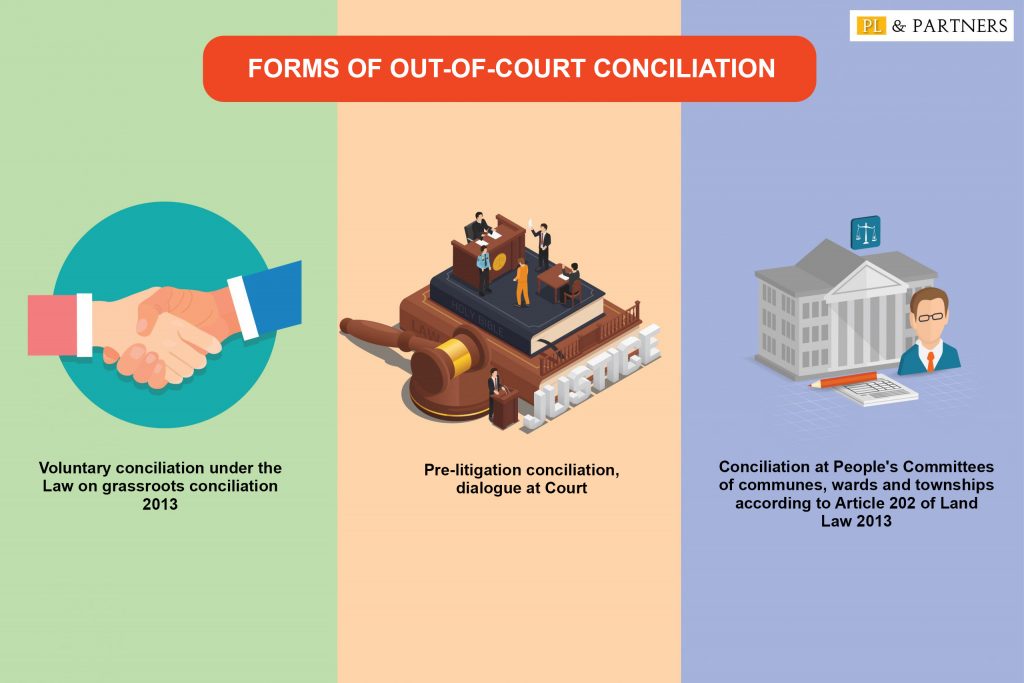Conciliation is one of the methods of resolving land disputes, including conciliation as a part of litigation and out-of-court conciliation. Through this article, PL & Partners Law Firm will inform you of what you need to know about conciliation of land disputes.
1. COMMON LAND DISPUTES.
Disputes over land and house ownership associated with land use rights are often intertwined. Through the practice of settlement of land disputes, it can be determined that this type of dispute can be divided into the following forms:
- Disputes over land use rights include: Disputes over who has the right to use the land; Disputes over who has the right to own houses attached to land use rights; Disputes over boundaries and boundary markers; Disputes on common pathway, alley, etc
- Disputes over the inheritance which is land use right or ownership of house attached to the land use right.
- Disputes over contracts and transactions related to land e. sale and transfer contract; deposit, mortgage; guarantee; convert; donation; leasing, borrowing; capital contribution contract; etc.
- Disputes over division of common property which is land use right: Division of common property of households, couples, individuals vs organizations.

2. CONCILIATION AS A PART OF LITIGATION.
Conciliation as a part of litigation is the one applied at the Court, arising when there is a petition related to a land dispute based on the request of the subjects who claim that their interests are affected.
The Civil Procedure Code 2015 stipulates that the Court, as the adjudicating body, is responsible for conducting conciliation and facilitating involved parties to reach an agreement on the settlement of civil cases in compliance with regulations (Article 10 of Civil Procedure Code 2015).
It can be seen that, according to the provisions of civil laws, conciliation is a mandatory process in legal proceedings, in order to create conditions for the parties to renegotiate the issues arising in the dispute, so that the dispute can be resolved peacefully, or decide to settle the dispute by continuing the lawsuit.
3. OUT–OF–COURT CONCILIATION.
In property sector, this method includes: pre-litigation conciliation at the Court, conciliation at commune-level People’s Committee and grassroots conciliation.
3.1. Voluntary conciliation under the Law on grassroots conciliation 2013.
In essence, grassroots conciliation is also a method of resolving land disputes with a view to reaching the final result by mutual agreements on the basis of free will of the parties involved in association with villages, hamlets, sub-quarters, quarters, and other residential communities (hereinafter collectively referred to as hamlets, sub-quarters). However, unlike other conciliations, the grassroots conciliation for land disputes is an optional type of conciliation, and is not a basis for determining the conditions for accepting the petition at the People’s Courts if a lawsuit is filed.
This is the method applied mainly for simple disputes, focusing on local disputes and supported by a third party – acting as an intermediary – conciliator working side by side with the conciliation team. Currently, the grassroots conciliation method is stipulated in the Law on grassroots conciliation 2013.
In order to ensure the objectivity and effectiveness of conciliation, the Law on grassroots conciliation 2013 encourages the participation of reputable people in the family, clan and community. The Law emphasizes that effective dispute resolution not only focuses on the role of the individual, but also places the individual next to the traditional relationship – the community under the influence of customs, traditions, village and local conventions.
3.2. Pre-litigation conciliation, dialogue at Court.
Pre-litigation conciliation is a method that is currently being piloted and has not been codified in legal documents. Up to now, Vietnam has had 16 provinces and cities piloting the construction of centers for conciliation and dialogue at the People’s Courts and having achieved some positive results. Conciliation is conducted before the court accepts the lawsuit petitions falling within its jurisdiction under the provisions of the Civil Procedure Code 2015, the Law on Administrative Procedures 2014. In particular, this method does not exclude other types of conciliation, nor does it exclude conciliation in legal proceedings (although the conciliation center is located in the headquarters of the People’s Court and there will be a conciliator appointed by the Chief Justice of the Supreme People’s Court who supports the resolution).
3.3. Conciliation at People’s Committees of communes, wards and townships according to Article 202 of the Land Law 2013.
Derived from the immobility of property and the historical nature of land use process associated with professional requirements of the management agency. Commune-level People’s Committees are considered to have sufficient competence and professional capacity to handle disputes peacefully on the basis of a system of data on land management such as cadastral maps and land use changes, land use plans, etc.
Article 3.2 of Resolution No. 04/2017/NQ-HDTP of Judicial Council of Supreme People’s Court stipulates: “For disputes over “who has the right to use the land” that have not been conciliated at the commune-level People’s Committee where the disputed land is located as prescribed in Article 202 of the 2013 Land Law, it shall be determined to be ineligible to initiate a lawsuit under the provisions of Article 192.1.b of Civil Code 2015.”
However, for land disputes, the effectiveness of conciliation is still very limited. There are many disputes that have to be conciliated many times but still do not come to the expected results. This unintentionally makes conciliation measures a cause for prolonging land disputes, prolonging the possibility of dispute settlement by legal proceedings to the expỉation date of the statute of limitations for initiating lawsuits for disputes related to land use rights transactions.
Conclusion: Conciliation of land disputes is a necessary procedure before deciding to initiate a lawsuit to the Court. People with land use rights are required to conciliate land disputes at the People’s Committees of communes, wards or townships where the disputed land is located before filing a lawsuit, otherwise they will not be eligible to initiate lawsuits at the People’s Court. The conciliation will be carried out in accordance with the procedures prescribed by law.

If clients need any services or have any inquiries about our services, please contact us:
PL AND PARTNERS LAW FIRM
Headquarters: 46th Floor, Bitexco Financial Tower, No. 2 Hai Trieu, Ben Nghe Ward, District 1, Ho Chi Minh City, Vietnam
Office: Lot 1.16 Viva Riverside, 1472 Vo Van Kiet, Ward 3, District 6, HCMC
Hotline: 093.1111.060
Email: info@pl-partners.vn
Facebook: www.facebook.com/PLLaw
Website: www.PL-PARTNERS.vn – www.HOIDAPLUAT.net – www.THUTUCPHAPLY.org
We are always ready to assist you.










